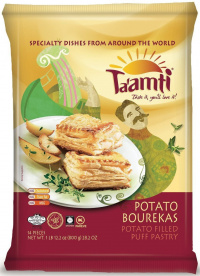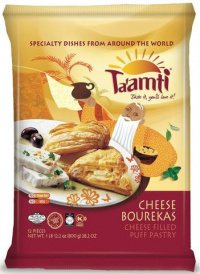Dairy Bread: Difference between revisions
From Halachipedia
No edit summary |
No edit summary |
||
| (5 intermediate revisions by the same user not shown) | |||
| Line 1: | Line 1: | ||
== | ==Breads and Other Foods== | ||
# The rabbis enacted a decree that one should not knead dough with milk, and if one does, one may not eat the bread even by itself. The reason given is that one is likely to make a mistake with the bread to perhaps eat the bread with meat. The same applies to meat bread.<ref>Pesachim 30a. This Gemara is brought in Rif Chullin 38a. S | # The rabbis enacted a decree that one should not knead dough with milk, and if one does, one may not eat the bread even by itself. The reason given is that one is likely to make a mistake with the bread to perhaps eat the bread with meat. The same applies to meat bread.<ref>Pesachim 30a. This Gemara is brought in Rif Chullin 38a. Shulchan Aruch Y"D 97:1.</ref> | ||
# If one shapes the bread in a unique way, then one can make dairy bread because people will notice the difference and will not come to make a mistake. Also, if one shapes the dairy bread into small pieces that are eaten at one time, then no leftovers will remain, and there is no possibility for a future mistake.<ref> | # According to most poskim this prohibition also applies to other foods besides bread.<Ref>Taz 97:1 applies the idea of dairy bread to spices. Pri Megadim S"D 97:1 writes that it applies specifically to bread since people's sustenance relies on bread. Horah Brurah 97:1 follows the Taz.</ref> | ||
# The prohibition to make dairy or meat bread extends to regular bread cooked in an unclean oven that has meat or milk residue where the bread is placed.<ref> | # It is permitted to make dairy cakes since it isn't normal to eat the cake with meat.<ref>Maharit 2:18 rules that it is permitted to make a sweet dairy dessert since it isn't normal to eat it with meat and it isn't forbidden lest someone eat it within 6 hours. Pitchei Teshuva 97:3 quotes the Maharit. Horah Brurah 97:1 agrees.</ref> Some say that it is forbidden to make meat cakes that aren't recognizably meat or in a small quantity since it is possible someone will eat it with milk.<ref>Horah Brurah 97:1</ref> | ||
# The custom was to make dairy bread for [[Shavuot]] and bread with meat fat for [[Shabbos]], since these breads were uniquely shaped and they were to be eaten specifically for the meals they were prepared for.<ref>Rema 97:1.</ref> | # It is forbidden to grind a lot of spices in a meat grinder since they stay for a long time and a person might forget and use them for dairy foods.<ref>Taz 97:1, Horah Brurah 97:1</ref> | ||
==Unique Shape== | |||
[[Image:Potato Bourekas.jpeg|200px|right]] | |||
[[Image:Cheese Bourekas.jpg|200px|left]] | |||
# If one shapes the bread in a unique way, then one can make dairy bread because people will notice the difference and will not come to make a mistake. Also, if one shapes the dairy bread into small pieces that are eaten at one time, then no leftovers will remain, and there is no possibility for a future mistake.<ref>Shulchan Aruch 97:1. The first leniency is brought by the Rif Chullin 38a where he explains that if one shapes the bread in the shape of an ox, then the bread would be mutar. Rosh Chullin 8:21 brings the opinion of Rashi that if one makes small pieces like small ox shapes of dairy bread, there is no concern that one may make a mistake. There are limitations brought by later authorities. Pitchei Teshuva 97:3 quotes the Maharit who explains that a unique shape is only a leniency for bread made for one's family. However, if the bread is sold in public, there is a concern that the consumers will not understand the meaning of the unique shape. Also, warning the consumers won't work because one may forget to warn them that the bread is dairy. The P"T quotes the Chavot Da'at who says that once the dairy bread is cooked, it is assur, and it is too late to then shape it in a unique way. Also, one cannot cut it up into small pieces and divide it up to many people, since the bread already became forbidden through the [[cooking]] process.</ref> | |||
# The prohibition to make dairy or meat bread extends to regular bread cooked in an unclean oven that has meat or milk residue where the bread is placed.<ref>Shulchan Aruch 97:1.</ref> | |||
# It is common especially in Israel to make cheese bourekas in a triangle shape and potato bourekas in a rectangular shape. If a place made the cheese bourekas in a rectangular shape some say that they are forbidden to eat.<ref>Eroch Shulchan 26 writes that if a bakery made a cheese bourekas in a rectangular shape they are forbidden. Even though the Tiferet Adam 15 and Ben Ish Chai Shelach 17 hold that bourekas can be meat or dairy without any particular shape because people know to check before eating them, that doesn't apply today in Israel when people know that triangular bourekas are cheese and rectangular are potato.</ref> | |||
==Small Portions== | |||
# It is permitted to make a small amount of dairy bread that is to used for the upcoming meal.<ref>Shulchan Aruch 97:1</ref> | |||
==Bread for Shabbos and Shavuot== | |||
# The custom was to make dairy bread for [[Shavuot]] and bread with meat fat for [[Shabbos]], since these breads were uniquely shaped and they were to be eaten specifically for the meals they were prepared for.<ref>Rema 97:1.</ref> | |||
==Bitul== | |||
# If the amount of dairy in the food will be nullified by sixty some say that it is permitted to make it, while others forbid making it. There is room to be lenient. There is a further dispute if initially it is permitted to eat that food with meat.<ref>Pitchei Teshuva 97:1</ref> | |||
==Sources== | ==Sources== | ||
<references/> | <references/> | ||
[[Category:Kashrut]] | [[Category:Kashrut]] | ||
{{Kashrut}} | |||
Latest revision as of 18:32, 13 July 2023
Breads and Other Foods
- The rabbis enacted a decree that one should not knead dough with milk, and if one does, one may not eat the bread even by itself. The reason given is that one is likely to make a mistake with the bread to perhaps eat the bread with meat. The same applies to meat bread.[1]
- According to most poskim this prohibition also applies to other foods besides bread.[2]
- It is permitted to make dairy cakes since it isn't normal to eat the cake with meat.[3] Some say that it is forbidden to make meat cakes that aren't recognizably meat or in a small quantity since it is possible someone will eat it with milk.[4]
- It is forbidden to grind a lot of spices in a meat grinder since they stay for a long time and a person might forget and use them for dairy foods.[5]
Unique Shape
- If one shapes the bread in a unique way, then one can make dairy bread because people will notice the difference and will not come to make a mistake. Also, if one shapes the dairy bread into small pieces that are eaten at one time, then no leftovers will remain, and there is no possibility for a future mistake.[6]
- The prohibition to make dairy or meat bread extends to regular bread cooked in an unclean oven that has meat or milk residue where the bread is placed.[7]
- It is common especially in Israel to make cheese bourekas in a triangle shape and potato bourekas in a rectangular shape. If a place made the cheese bourekas in a rectangular shape some say that they are forbidden to eat.[8]
Small Portions
- It is permitted to make a small amount of dairy bread that is to used for the upcoming meal.[9]
Bread for Shabbos and Shavuot
- The custom was to make dairy bread for Shavuot and bread with meat fat for Shabbos, since these breads were uniquely shaped and they were to be eaten specifically for the meals they were prepared for.[10]
Bitul
- If the amount of dairy in the food will be nullified by sixty some say that it is permitted to make it, while others forbid making it. There is room to be lenient. There is a further dispute if initially it is permitted to eat that food with meat.[11]
Sources
- ↑ Pesachim 30a. This Gemara is brought in Rif Chullin 38a. Shulchan Aruch Y"D 97:1.
- ↑ Taz 97:1 applies the idea of dairy bread to spices. Pri Megadim S"D 97:1 writes that it applies specifically to bread since people's sustenance relies on bread. Horah Brurah 97:1 follows the Taz.
- ↑ Maharit 2:18 rules that it is permitted to make a sweet dairy dessert since it isn't normal to eat it with meat and it isn't forbidden lest someone eat it within 6 hours. Pitchei Teshuva 97:3 quotes the Maharit. Horah Brurah 97:1 agrees.
- ↑ Horah Brurah 97:1
- ↑ Taz 97:1, Horah Brurah 97:1
- ↑ Shulchan Aruch 97:1. The first leniency is brought by the Rif Chullin 38a where he explains that if one shapes the bread in the shape of an ox, then the bread would be mutar. Rosh Chullin 8:21 brings the opinion of Rashi that if one makes small pieces like small ox shapes of dairy bread, there is no concern that one may make a mistake. There are limitations brought by later authorities. Pitchei Teshuva 97:3 quotes the Maharit who explains that a unique shape is only a leniency for bread made for one's family. However, if the bread is sold in public, there is a concern that the consumers will not understand the meaning of the unique shape. Also, warning the consumers won't work because one may forget to warn them that the bread is dairy. The P"T quotes the Chavot Da'at who says that once the dairy bread is cooked, it is assur, and it is too late to then shape it in a unique way. Also, one cannot cut it up into small pieces and divide it up to many people, since the bread already became forbidden through the cooking process.
- ↑ Shulchan Aruch 97:1.
- ↑ Eroch Shulchan 26 writes that if a bakery made a cheese bourekas in a rectangular shape they are forbidden. Even though the Tiferet Adam 15 and Ben Ish Chai Shelach 17 hold that bourekas can be meat or dairy without any particular shape because people know to check before eating them, that doesn't apply today in Israel when people know that triangular bourekas are cheese and rectangular are potato.
- ↑ Shulchan Aruch 97:1
- ↑ Rema 97:1.
- ↑ Pitchei Teshuva 97:1

